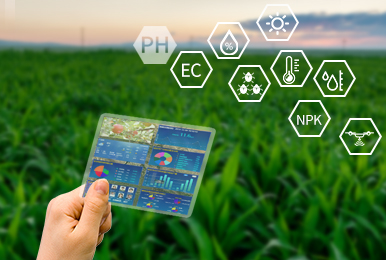As we stand at the brink of an ever-evolving world, it becomes essential to find innovative ways to meet the growing demand for food while preserving our resources. In this pursuit, precision agriculture has emerged as a groundbreaking solution, leveraging advanced technologies to optimize farming practices. Among the key tools driving this agricultural revolution are soil sensors, empowering farmers with invaluable insights into the heartbeat of Mother Earth. In this article, we will delve into the potential of soil sensor technology and its transformative impact on agriculture.

The Power of Soil Sensors:
Soil sensors act as the eyes and ears of farmers, providing them with real-time data about the soil's composition, moisture levels, temperature, pH balance, and nutrient content. By monitoring these vital parameters, farmers can make informed decisions and take proactive measures to enhance productivity while minimizing resource waste. Soil sensors enable a deeper understanding of soil health, helping farmers unleash the full potential of their land.
Optimizing Irrigation Management:
Water is a precious resource, and efficient irrigation management is vital for sustainable agriculture. Soil sensors play a pivotal role in optimizing water usage by providing accurate information regarding soil moisture levels. Farmers can determine when and how much water to apply, preventing under or over-irrigation that can result in crop stress or water wastage. By fine-tuning irrigation practices based on real-time data, farmers can maximize water efficiency, conserve resources, and ensure optimal crop growth.
Precision Nutrient Management:
Balanced nutrient management is crucial for healthy plant growth and high-quality yields. Soil sensors offer invaluable insights into the nutrient composition of the soil, allowing farmers to tailor fertilizer applications accordingly. By analyzing soil data, farmers can optimize the timing, quantity, and placement of fertilizers, ensuring that crops receive the necessary nutrients without excess or deficiency. This targeted approach minimizes nutrient runoff, reduces environmental impact, and promotes sustainable farming practices.
Early Detection of Soil Problems:
Soil sensors empower farmers to detect potential soil problems at an early stage, enabling prompt intervention and prevention measures. Changes in soil moisture, temperature, and nutrient levels can indicate the presence of diseases, pests, or imbalances. By monitoring these parameters, farmers receive real-time alerts about abnormal conditions in their fields. Early detection allows for targeted treatments, reducing the need for excessive pesticide or herbicide use and mitigating crop losses. Timely action ensures a healthier soil ecosystem and better overall yield.
Site-Specific Farming:
Field variability is a reality that farmers face, with different areas of the farm exhibiting varying soil conditions and crop requirements. Soil sensors enable farmers to create detailed soil maps and understand spatial variability within their fields. By pinpointing variations in pH levels, nutrient content, and moisture, farmers can adopt a site-specific approach to farming. This tailored strategy involves adjusting planting densities, fertilization rates, and irrigation schedules to suit specific field conditions. The result is optimized resource allocation, improved crop uniformity, and enhanced productivity.
Integration with Advanced Technologies:
Soil sensors integrate seamlessly with other advanced agricultural technologies, forging a path towards smarter farming practices. With the advent of precision farming, which includes technologies such as GPS systems, drones, and remote sensing, the potential for data-driven decision making has reached new heights. Combining data from soil sensors with information from other sources, such as aerial imagery or weather forecasts, provides a holistic view of the farm's status. This integration enhances the accuracy of decision-making processes, enabling farmers to respond swiftly to changing conditions and improve overall farm management.
Future Possibilities:
The transformative power of soil sensor technology extends beyond the present, offering endless possibilities for the future of agriculture. As technology continues to advance, soil sensors may evolve to measure an even broader range of parameters, including organic matter content, soil compaction, and greenhouse gas emissions. Moreover, advancements in connectivity and data analytics will enable more sophisticated algorithms and predictive models, allowing farmers to anticipate potential challenges and optimize farming strategies.
Conclusion:
Soil sensors have unlocked the potential of earth, empowering farmers with critical insights into soil health, irrigation management, nutrient optimization, early pest detection, and site-specific farming. By harnessing the power of this technology, farmers can make data-driven decisions, preserve resources, mitigate environmental impact, and maximize crop productivity. As we continue to explore the possibilities, soil sensor technology will undoubtedly play a central role in shaping a sustainable and prosperous future for agriculture, enabling us to meet the global demand for food while nurturing and preserving our precious earth.





